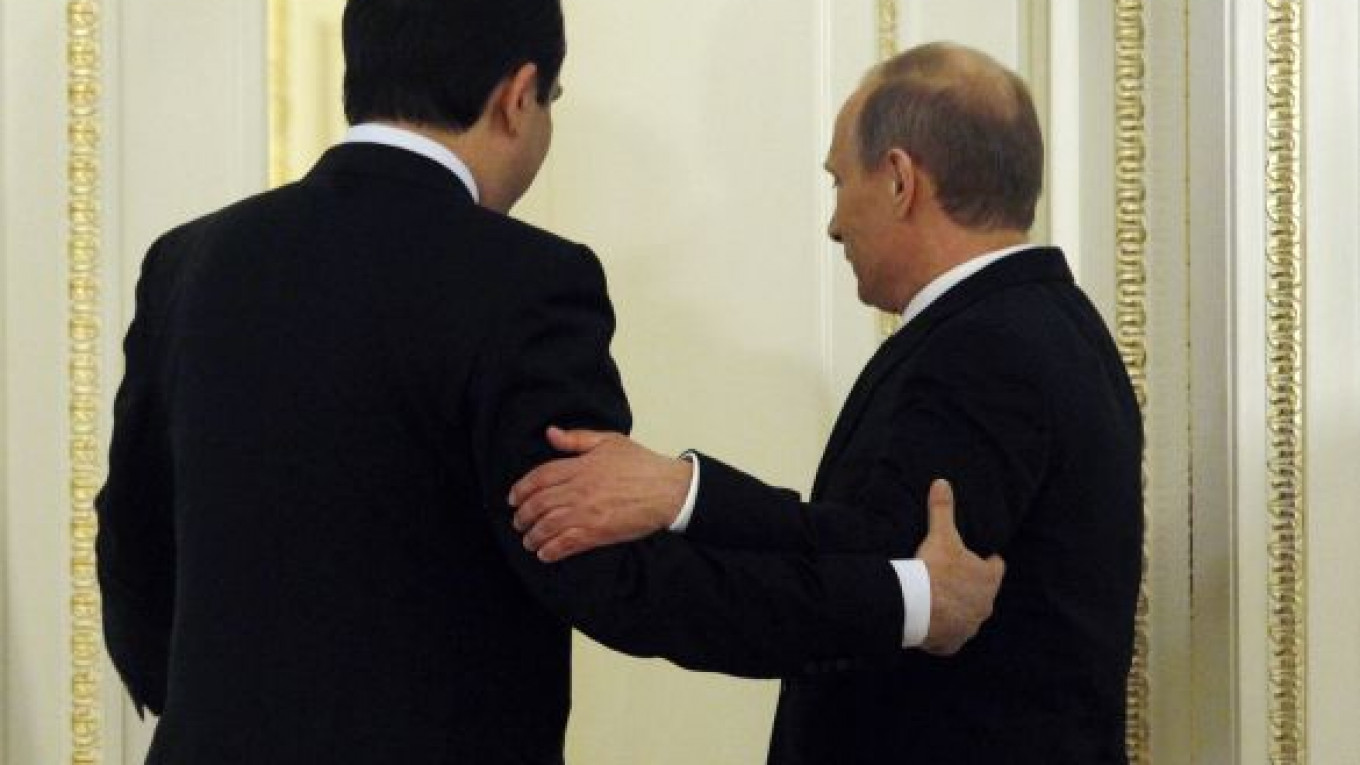Russia and Kazakhstan said Friday that they planned to join the WTO together, but without Belarus, which snubbed a meeting on their trilateral customs union after Moscow ignored President Alexander Lukashenko's offer to trade Belarussian energy assets for lower fuel prices.
The prime ministers from Russia, Kazakhstan and Belarus had been scheduled to meet in St. Petersburg on Friday to sign documents on their customs union, which enters its second stage July 1. Prime Minister Vladimir Putin cast doubt on the deadline earlier in the week, saying 18 additional agreements needed to be signed.
Belarussian Prime Minister Sergei Sidorsky skipped the meeting because of “the current ongoing disagreements on some principal matters,” spokesman Alexander Timoshenko told Interfax on Friday.
Despite the snub, Putin said Minsk was still welcome to join the customs union. But Moscow and Astana are ready to proceed with the union and accession talks to the World Trade Organization without Belarus.
"Of course, if we apply bilaterally as the customs union, it will be easier than if we applied trilaterally," Putin said during a news conference with his Kazakh counterpart, Karim Masimov. "The more sides participating in the process, the more problems. Because every state is protecting its economic interests."
After the first stage of the customs union formally came into force Jan. 1, Russia canceled a 36 percent discount on its oil export duty for Belarus. The move raised costs for Belarussian plants that refine and re-export Russian oil.
In return, Moscow dropped the duty altogether for 6.3 million metric tons of oil that Belarus needs for domestic consumption. But even the resulting $1.8 billion windfall could not cover the lost revenue for Belarus, which analysts estimated at $5 billion to $6 billion per year, or more than 10 percent of the country's entire economy.
“Since January, Minsk was deprived of a big part of its revenue, which makes it economically unfeasible for Minsk to proceed with the trilateral customs union,” said Yaroslav Romanchuk, head of Mises Center, a Belarussian liberal think tank.
Lukashenko created a small sensation ahead of the Friday meeting when he said he was ready to sell control in Beltransgaz, which operates the Belarussian gas transportation system, to Gazprom in exchange for cheaper gas.
“I'm not opposed [to selling Beltrangaz] if they say that they will supply gas to Belarus at the internal Russian prices in exchange,” Lukashenko said Thursday, Interfax reported. “If it is on equal terms, then [let them] take the controlling stake.”
He also offered up the Mozyrsky oil refinery, one of the two plants that refines Russian crude, in exchange for oil at Russian domestic prices.
Belarus controls almost 43 percent of the refinery directly and another 12.3 percent through a state-owned company, Interfax reported. Slavneft, a 50-50 joint venture between TNK-BP and Gazprom Neft, owns about 42.6 percent.
Deputy Prime Minister Igor Sechin poured cold water on the idea Friday, saying he saw no economic reason for Russia to raise its stake in Beltransgaz, which is already half-owned by Gazprom.
Energy Minister Sergei Shmatko had called the idea "interesting" late Thursday, but noted that it would not solve Belarus' debt problems.
“We think that we overpaid even for the 50 percent” Gazprom already owns, Sechin said, referring to the $2.5 billion it paid in 2007 after a dispute over gas transit disrupted supplies to Europe.
Canceling export duties for Belarus would cost Russia $4 billion on gas and $12 billion on oil over the next four years, Kommersant reported Saturday.
Gazprom will not cooperate with Belarus until its debt is paid, spokesman Sergei Kupriyanov said Friday. Minsk owes the gas export monopoly $192 million because it is paying $150 per thousand cubic meters of gas, instead of the contract price of $169 in the first quarter and $184 in the second, he said.
Although Moscow has been pushing for control of Ukraine's gas pipelines, which deliver about 80 percent of its gas exports to Europe, Beltransgaz is not a particularly appealing asset, analysts said.
“With the ongoing construction of the North Stream and South Stream pipelines, the value of the Belarussian gas transportation system is decreasing, and Gazprom is unlikely to increase its stake at the moment,” Romanchuk said.
Lukashenko was faking generosity by offering useless assets to get valuable discounts, he said. “It looks like Moscow will keep on increasing economic pressure on Belarus, and Lukashenko will keep on opposing, which would in the long run weaken his regime."
A Message from The Moscow Times:
Dear readers,
We are facing unprecedented challenges. Russia's Prosecutor General's Office has designated The Moscow Times as an "undesirable" organization, criminalizing our work and putting our staff at risk of prosecution. This follows our earlier unjust labeling as a "foreign agent."
These actions are direct attempts to silence independent journalism in Russia. The authorities claim our work "discredits the decisions of the Russian leadership." We see things differently: we strive to provide accurate, unbiased reporting on Russia.
We, the journalists of The Moscow Times, refuse to be silenced. But to continue our work, we need your help.
Your support, no matter how small, makes a world of difference. If you can, please support us monthly starting from just $2. It's quick to set up, and every contribution makes a significant impact.
By supporting The Moscow Times, you're defending open, independent journalism in the face of repression. Thank you for standing with us.
Remind me later.


